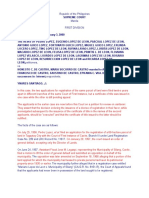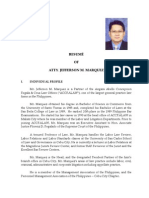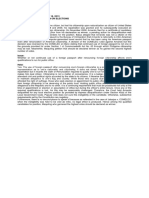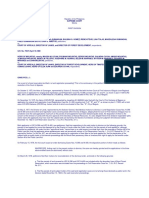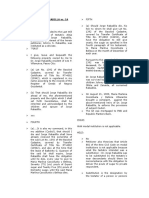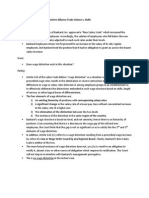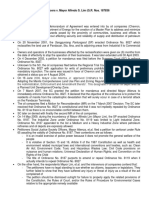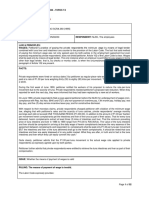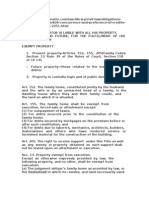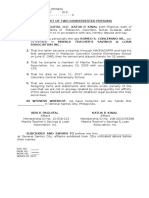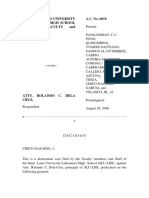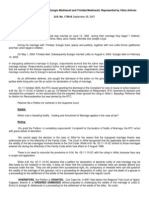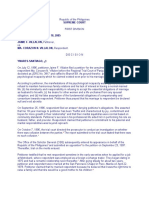Case No.
40
The Law Firm of Raymundo A. Armovit vs. CA and Bengson Commercial Building
G.R. No. 154559: October 5, 2011
THE LAW FIRM OF RAYMUNDO A. ARMOVIT, Petitioner,
vs.
COURT OF APPEALS and BENGSON COMMERCIAL BUILDING, INC., Respondents
DOCTRINE: It is basic that when there is a conflict between the dispositive portion or
fallo of a Decision and the opinion of the court contained in the text or body of the
judgment, the former prevails over the latter. This rule rests on the theory that the fallo is
the final order while the opinion in the body is merely a statement ordering nothing.
FACTS: Herein petitioner was the counsel for the private respondent in an action of the
latter for the annulment of an extrajudicial foreclosure against GSIS, where the former
got a favorable decision from both the lower court and appellate court. Prior to the appeal
filed by GSIS, the petitioner ceased to be the counsel of the private respondent, resulting
for the latter to acquire the service of a new counsel. The decision of the appellate court
became final and executory.
The petitioner was informed that the private respondent would pay him the agreed
compensation even though retained the services of a different counsel. However, the said
respondent ignored his billings, he sought the entry of an attorney's lien in the records of
the case. The lower court allegedly refused to make the entry and on the contrary, issued
an order for PNB to release to the custody of the president and new counsel of the private
respondent the payment as rentals payable by the Government Service Insurance System.
During the hearing on the petition to record attorney's charging lien the petitioner
withdrew the petition to record attorney's charging lien, which was duly approved by the
Court, after which the Court directed the parties to comply faithfully with their respective
obligations. The petitioner received P300,000.00 from the private respondent as a
fulfillment of the obligation of the latter. The former protested that the amount must be
P552,000.00 (twenty percent of P2,760,000.00) and demanded the remaining amount.
The lower court, on the other hand, said that the private respondent fully complied with
its obligations, and as confirmed with the appellate court, the receipt evidencing payment
to the petitioner "was without any qualification as 'advance' or 'partial' or 'incomplete',"
the intention of the parties was that it was full payment. Said court also noted the
withdrawal of the motion of the petitioner to record attorney's lien and figured that the
latter was satisfied with the payment of P300,000.00.
MGM
Civil Procedure
Cases 40-44
� The petitioner argued that the 20% of all recoveries mentioned in the decision of the
lower court on the recording of attorney’s lien should include not only the rental fee but
the value of all the properties recovered by the private respondent, and that said
percentage is reasonable. However, the private respondent contends that the dispositive
portion of the decision expressly stated the exact amount that needs to be complied with.
ISSUE: Whether or not the opinion of the court contained in the text or body of the
judgment prevails over its dispositive portion or fallo as basis for the attorney’s fees .
HELD: The Supreme Court was enlightened with their ruling in Grageda v. Gomez that
when there is a conflict between the dispositive portion or fallo of a decision and the
opinion of the court contained in the text or body of the judgment, the former prevails
over the latter. An order of execution is based on the disposition, not on the body, of the
Decision. This rule rests on the theory that the fallo is the final order while the opinion in
the body is merely a statement ordering nothing.
The only exception to this rule is where the inevitable conclusion from the body
of the decision is so clear as to show that there was a mistake in the dispositive portion,
the body of the decision will prevail.
In this case, it is clear that the statement in the body of the decision is not an order
which can be the subject of execution. Neither can the said court ascertain from the body
of the Decision an inevitable conclusion clearly showing a mistake in the dispositive
portion. On the contrary, the context in which the statement was used shows that it is
premised on the interpretation that the valid claim of the petitioner is only for an
additional P252,000.00 in attorney’s fees. Hence, the dispositive portion of the decision
prevails resulting for the petition to be dismissed.
Case No. 41
HH Co. Agri Corp. Vs. Perlas
G.R. No. 217095: February 12, 2020
HH & CO. AGRICULTURAL CORPORATION, Petitioner
VS.
ADRIANO PERLAS, Respondent
FACTS:
Petitioner prayed for the RTC to grant writ of possession over the property he bought as
the highest bidder in the foreclosure sale. RTC so granted. Respondent opposed the granted writ
of possession contending that they are the real owner and that there’s a writ of preliminary
MGM
Civil Procedure
Cases 40-44
�injunction over the said property. RTC granted the motion to quash writ of possession by
respondent.
RTC said, that to execute writ of possession could not be possible as there’s a legal
impediment due to the writ of preliminary injunction. Petitioner elevated the case to the CA
stating that to grant and execute writ of possession is a ministerial duty.
CA, then and there, still favored respondent with the same justification of RTC. Petitioner
then appealed to the SC contending that respondent, upon filing motion to quash, should never
have been given due course because it was filed after the writ of possession was granted thus,
making the judgment attain finality.
ISSUE:
Whether or not judgment already attained finality upon respondent’s filing of the motion
to quash.
RULING:
Yes. judgment had already attained finality hence, it is already immutable.
The Court stresses that as a rule, a final judgment is immutable and unalterable. It cannot
be disturbed or modified by any court even if the purpose of the alteration is to rectify perceived
errors of fact or law.
The doctrine of immutability of judgment is for the purpose of avoiding delay in the
administration of justice and of putting an end. to judicial controversies which cannot drag
perpetually. Pursuant to this doctrine, courts have the ministerial duty to enforce judgment that
already attained finality. Notably, there are established exceptions to the foregoing rule, namely:
i) the correction of clerical errors;
ii) presence of num pro tune entries, which cause no prejudice to any party;
iii) void judgment; and,
iv) whenever circumstances transpire after the finality of the judgment which renders the
execution unjust and inequitable.
In this case, none of the foregoing exceptions is applicable. It must be noted that the
assailed RTC Order-26 dated March 16, 2009 which granted petitioner’s application for writ of
possession had already become final and executory. The RTC had in fact already issued the
corresponding entry of judgment on April 27, 2009.
MGM
Civil Procedure
Cases 40-44
�Case No. 42
Taisei Shimizu Joint Venture vs. COA
G.R. No. 238671 : June 2, 2020
TAISEI SHIMIZU JOINT VENTURE, Petitioner
VS.
COMMISSION ON AUDIT AND THE DEPARTMENT OF TRANSPORTATION
(FORMERLY DEPARTMENT OF TRANSPORTATION AND COMMUNICATION),
Respondent
FACTS:
Petitioner TSJV won the contract award for the construction of the New Iloilo Airport.
As project proponent, respondent Department of Transportation5 (DOTr) entered into a contract
agreement with TSJV on March 15, 2004, pertaining to the construction. Following the project’s
completion and delivery, it turned out that some TSJV billings had been left unpaid.
After TSJV’s initial effort to collect failed, it filed with the CIAC a Request for
Arbitration and Complaint, payment of eight (8) money claims amounting to
Php2,316,687,603.037. In defense of the government, the DOTr responded to the Complaint and
actively participated in the ClAC proceedings.
Under its Final Award dated December 11, 2014, the ClAC granted only four (4) claims
out of eight (8), which only amounted to Php223,401,870.83. The DOTr was likewise directed to
pay six percent (6%) interest per annum on the total amount from the finality of the Final Award
until full payment.
Subsequently acting on the DOTr’s motion for correction of the Final Award, the CIAC,
by Order dated February 20, 2015,10 reduced its Claim No.3 which is the “Interest and Delayed
payment”. Consequently, CIAC favored DOTr’s motion, the arbitral tribunal amended the Final
Award to and reduced the award to Php216,073,986.89.
MGM
Civil Procedure
Cases 40-44
� The Ex Officio Sheriff thereafter served a demand to satisfy the arbitral award on the
DOTr and issued notices of garnishment to the Philippine National Bank (PNB), Philippine
Veterans Bank (PVB), Land Bank of the Philippines (LBP), and Development Bank of the
Philippines (DBP). The DOTr later on advised TSJV in writing that the arbitral award should be
referred to the COA as condition sine qua non for payment. The LBP advised that claimant TSJV
must first seek the COA’s approval for payment of the arbitral award.
TSJV subsequently filed with the COA a petition for enforcement and payment of the
arbitral award and the DOTr, through the Office of the Solicitor General (OSG) has no objection
nor further comments to the petition. However, the COA approved payment but only to the
extent of Phpl04,661,421.35 or less than half of the total award. Asserting its primary
jurisdiction over money claims against government agencies and instrumentalities, the COA
claimed to have reviewed the evidence.
After receiving the approved award of Php104,661,421.35, TSJV pursued its partial
motion for reconsideration as regards the remaining amount of Php 11,412,565.54. However, the
COA denied the motion for partial reconsideration.
TSJV now seeks affirmative relief from the Court, charging the COA with grave abuse of
discretion, amounting to excess or lack of jurisdiction in disturbing the immutable and final
arbitral award in its favor.
ISSUE:
W/N, In the exercise of its audit power, may the COA disturb the final and
executory decisions of courts, tribunals or other adjudicative bodies.
RULING:
No, the COA cannot disturb the final and executory decision of courts, tribunals or other
adjudicative bodies.
A. Once a court or other adjudicative body validly acquires jurisdiction over a money
claim against the government. it exercises and retains jurisdiction over the subject
matter to the exclusion of all others, including the COA.
Even if we broadly interpret the COA’s jurisdiction as including all kinds of money
claims, it cannot take cognizance of factual and legal issues that have been raised or could have
been raised in a court or other tribunal that had previously acquired jurisdiction over the same.
To repeat, the COA’s original jurisdiction is actually limited to liquidated claims and quantum
meruit cases. It cannot interfere with the findings of a court or an adjudicative body that decided
an unliquidated money claim involving issues requiring the exercise of judicial functions or
specialized knowledge and expertise which the COA does not have in the first place.
MGM
Civil Procedure
Cases 40-44
� B. The COA has no appellate review power over the decisions of any other court or
tribunal.
Once judgment is rendered by a court or tribunal over a money claim involving the State,
it may only be set aside or modified through the proper mode of appeal. It is elementary that the
right to appeal is statutory. There is no constitutional nor statutory provision giving the COA
review powers akin to an appellate body such as the power to modify or set aside a judgment.
C. The COA is devoid of power to disregard the principle of immutability of final
judgments.
When a court or tribunal having jurisdiction over an action renders judgment and the
same becomes final and executory, res judicata sets in. Norkis Trading Corp. v. Buenavista50
explains:
xxx Res judicata is defined as a matter adjudged; a thing judicially acted upon or
decided; a thing or matter settled by judgment. Under this doctrine, an existing final judgment
or decree rendered on the merits, and without fraud or collusion, by a court of competent
jurisdiction, upon any matter within its jurisdiction, is conclusive of the rights of the parties or
their privies, in all other actions or suits in the same or any other judicial tribunal of concurrent
jurisdiction on the points and matters in issue in the first suit. To state simply, a final judgment
or decree on the merits by a court of competent jurisdiction is conclusive of the rights of the
parties or their privies in all later suits on all points and matters determined in the former suit.
Res judicata has two aspects: bar by prior judgment and conclusiveness of judgment as
provided under Section 47 (b) and (c), Rule 39, respectively, of the Rules of Court. Under the
doctrine of conclusiveness of judgment, facts and issues actually and directly resolved in a
former suit cannot be raised in any future case between the same parties, even if the latter suit
may involve a different cause of action. (Emphasis supplied.)
Res judicata and immutability of final judgments are closely intertwined. Jurisprudence
teaches:
The settled and firmly established rule is that a decision that has acquired finality
becomes immutable and unalterable. This quality of immutability precludes the
modification of the judgment, even if the modification is meant to correct erroneous
conclusions of fact and law.
The orderly administration of justice requires that, at the risk of occasional
errors, the judgments/resolutions of a court must reach a point of finality set by the law. The
noble purpose is to write finis to disputes once and for all. This is a fundamental principle in
our justice system, without which no end to litigations will take place. Utmost respect and
adherence to this principle must always be maintained by those who exercise the power of
adjudication. Any act that violates such principle must immediately be struck down. Indeed, the
principle of conclusiveness of prior adjudications is not confined in its operation to the
MGM
Civil Procedure
Cases 40-44
�judgments of courts, but extends as well to those of all other tribunals exercising adjudicatory
powers.
D. The COA’s discretion in approving or disapproving money claims that have been
determined by final judgment is akin to the power of an execution court.
To emphasize, the COA’s jurisdiction over final money judgments rendered by the courts
pertains only to the execution stage. The COA’s authority lies in ensuring that public funds are
not diverted from their legally appropriated purpose to answer for such money judgments. And
rightly so since the COA is tasked to guarantee that the enforcement of these final money
judgments be in accord with auditing laws which it ought to implement.
Indeed, a final and executory judgment can no longer be disturbed, altered, or modified in
any respect, and that nothing further can be done but to execute it. Succinctly, an execution court
may no longer alter a final and executory judgment save under certain exceptions such as (i) the
correction of clerical errors; (ii) the so-called nunc pro tunc entries which cause no prejudice to
any party; (iii) void judgments; and (iv) whenever circumstances transpire after the finality of the
decision rendering its execution unjust and inequitable.
This is true even if the purpose of the modification or amendment is to correct perceived
errors of law or fact in relation to its audit review power, therefore, the COA here should have
restricted itself to determining the source of public funds from which the final and executory
arbitral award may be satisfied pursuant to the general auditing laws the COA is tasked to
implement.
MGM
Civil Procedure
Cases 40-44
�Case No. 43
Dare Adventure Farm Corp. vs. Court of Appeals,
G.R. No. 161122 : September 24, 2012
DARE ADVENTURE FARM CORPORATION, Petitioner,
Vs.
v. HON. COURT OF APPEALS, MANILA, HON. AUGUSTINE VESTIL, as Presiding Judge of RTC-
CEBU, Br. 56, MANDAUE CITY, SPS. FELIX NG AND NENITA NG, and SPS. MARTIN T. NG AND
AZUCENA S. NG AND AGRIPINA R. GOC-ONG, Respondents.
A decision rendered on a complaint in a civil action or proceeding does not bind or prejudice a person not impleaded therein, for
no person shall be adversely affected by the outcome of a civil action or proceeding in which he is not a party. Hence, such
person cannot bring an action for the annulment of the judgment under Rule 47 of the 1997 Rules of Civil Procedure, except if he
has been a successor in
interest by title subsequent to the commencement of the action, or the action or proceeding is in rem the judgment in which is
binding against him.
FACTS:
The petitioner acquired a parcel of land through a deed of absolute sale executed on July 28, 1994
between the petitioner, as vendee, and Agripina R. Goc-ong (a respondent herein), Porferio Gocong,
Diosdado Goc-ong, Crisostomo Goc-ong, Tranquilino Goc-ong, Naciancena Goc-ong and Avelino Goc-
ong (collectively, the Goc-ongs), as vendors.
The petitioner later on discovered the joint affidavit executed on June 19, 1990 by the Goc-ongs,
whereby the Goc-ongs declared that they were the owners of the property, and that they were
mortgaging the property to the Ngs to secure their obligation amounting to P648,000.00, subject to the
condition that should they not pay the stipulated 36-monthly installments, the Ngs would automatically
become the owners of the property.
With the Goc-ongs apparently failing to pay their obligation to the Ngs as stipulated, the latter
brought on January 16, 1997 a complaint for the recovery of a sum of money, or, in the alternative, for the
foreclosure of mortgage in the Regional Trial Court, Branch 56, in Mandaue City (RTC) only against
respondent Agripina R. Goc-ong.The action was docketed as Civil Case No. MAN-2838. With Agripina
R. Goc-ong being declared in default for failing to file her answer in Civil Case No. MAN-2838, the RTC
declared the respondents as the owners.
In 2001, the petitioner commenced in the CA an action for the annulment of the decision of the
RTC, however the CA dismissed the petition for annulment of judgment.
ISSUE:
Whether the action for annulment of judgment under Rule 47 was a proper recourse for the
petitioner to set aside the decision rendered in Civil Case No. MAN-2838. (NO)
MGM
Civil Procedure
Cases 40-44
�RULING:
No. A petition for annulment of judgment is a remedy in equity so exceptional in nature that it
may be availed of only when other remedies are wanting, and only if the judgment, final order or final
resolution sought to be annulled was rendered by a court lacking jurisdiction or through extrinsic fraud.
Yet, the remedy, being exceptional in character, is not allowed to be so easily and readily abused by
parties aggrieved by the final judgments, orders or resolutions The Court has thus instituted safeguards by
limiting the grounds for the annulment to lack of jurisdiction and extrinsic fraud, and by prescribing in
Section 1 of Rule 47 of the Rules of Court that the petitioner should show that the ordinary remedies of
new trial, appeal, petition for relief or other appropriate remedies are no longer available through no fault
of the petitioner. A petition for annulment that ignores or disregards any of the safeguards cannot prosper.
It is elementary that a judgment of a court is conclusive and binding only upon the parties and
those who are their successors in interest by title after the commencement of the action in court.
Moreover, Section 1 of Rule 47 extends the remedy of annulment only to a party in whose favor the
remedies of new trial, reconsideration, appeal, and petition for relief from judgment are no longer
available through no fault of said party. As such, the petitioner, being a non-party in Civil Case No.
MAN-2838, could not bring the action for annulment of judgment due to unavailability to it of the
remedies of new trial, reconsideration, appeal, or setting the judgment aside through a petition for relief.
In this case, the petitioner probably brought the action for annulment upon its honest belief that
the action was its remaining recourse from a perceived commission of extrinsic fraud against it. It is
worthwhile for the petitioner to ponder, however, that permitting it despite its being a non-party in Civil
Case No. MAN-2838 to avail itself of the remedy of annulment of judgment would not help it in any
substantial way. Although Rule 47 would initially grant relief to it from the effects of the annulled
judgment, the decision of the CA would not really and finally determine the rights of the petitioner in the
property as against the competing rights of the original parties. To be borne in mind is that the annulment
of judgment is an equitable relief not because a party-litigant thereby gains another opportunity to reopen
the already-final judgment but because a party-litigant is enabled to be discharged from the burden of
being bound by a judgment that was an absolute nullity to begin with.
The Court agrees with the CA’s suggestion that the petitioner’s proper recourse was either an
action for quieting of title or an action for reconveyance of the property. It is timely for the Court to
remind that the petitioner will be better off if it should go to the courts to obtain relief through the proper
recourse; otherwise, it would waste its own time and effort, aside from thereby unduly
burdening the dockets of the courts.
Case No. 44
De Castro vs. Assidao-De Castro
G.R. No. 160172: February 13, 2008
REINEL ANTHONY B. DE CASTRO, petitioner,
vs.
ANNABELLE ASSIDAO-DE CASTRO, respondent.
Facts:
Annabelle and Reinel applied for a marriage license. However, when they went back to the Office of
the Civil Registrar, the marriage license had already expired. Thus, in order to get married as soon as possible,
they executed an Affidavit dated 13 March 1995 to show that they had been living together as husband and
MGM
Civil Procedure
Cases 40-44
�wife for the last five years, hence, exempt from the marriage license requirement. They got married on the
same date before a judge. After the ceremony, however, they did not live together as husband and wife.
In November 1995, Annabelle gave birth to a child named Reinna Tricia.
In 1998, Annabelle filed a petition for support against Reinel, claiming that he had not given support
to her and their child.
In his answer, Reinel denied that he is married to Annabelle, claiming that their marriage is void ab
initio since the marriage was facilitated by a fake affidavit. He alleged that they never cohabited with each
other five years before their marriage, hence they were not exempted from the requirement of a
marriage license. He also denied being the father of Tricia.
The trial court ruled that the marriage between Annabelle and Reinel is not valid because it was
solemnized without a marriage license. However, it declared Reinel as the natural father of the Tricia, and thus
obliged to give her support. Reinel appealed.
The CA ruled that since the case is an action for support, it was improper for the trial court to declare
the marriage of Annabelle and Reinel as null and void in the very same case. There was no participation of the
State, through the prosecuting attorney or fiscal, to see to it that there is no collusion between the parties, as
required by the Family Code in actions for declaration of nullity of a marriage. It also ruled that Tricia, having
born during the subsistence of a marriage, is the legitimate child of Reinel.
Issues:
W/N the trial court has jurisdiction to determine the validity of the marriage between Reinel and
Annabelle even though the case before it is for support? In other words, may the marriage be attacked
collaterally?
Contentions:
Petitioner’s: In any case, petitioner argues that the trial court had jurisdiction to determine the invalidity of
their marriage since it was validly invoked as an affirmative defense in the instant action for support. Citing
several authorities, petitioner claims that a void marriage can be the subject of a collateral attack. Thus, there is
no necessity to institute another independent proceeding for the declaration of nullity of the marriage between
the parties. The refiling of another case for declaration of nullity where the same evidence and parties would be
presented would entail enormous expenses and anxieties, would be time-consuming for the parties, and would
increase the burden of the courts.
Respondent’s: Respondent claims that the instant petition is a mere dilatory tactic to thwart the finality of the
decision of the Court of Appeals. Echoing the findings and rulings of the appellate court, she argues that the
legitimacy of their marriage cannot be attacked collaterally, but can only be repudiated or contested in a direct
suit specifically brought for that purpose.
Held:
Yes. The validity of a void marriage may be collaterally attacked. In Nial v. Bayadog, we held:
However, other than for purposes of remarriage, no judicial action is necessary to declare a marriage
an absolute nullity. For other purposes, such as but not limited to determination of heirship, legitimacy or
illegitimacy of a child, settlement of estate, dissolution of property regime, or a criminal case for that matter,
MGM
Civil Procedure
Cases 40-44
�the court may pass upon the validity of marriage even in a suit not directly instituted to question the same so
long as it is essential to the determination of the case. This is without prejudice to any issue that may arise in
the case. When such need arises, a final judgment of declaration of nullity is necessary even if the purpose is
other than to remarry. The clause on the basis of a final judgment declaring such previous marriage void in
Article 40 of the Family Code connotes that such final judgment need not be obtained only for purpose of
remarriage.
Likewise, in Nicdao Cariño v. Yee Cariño, the Court ruled that it is clothed with sufficient
authority to pass upon the validity of two marriages despite the main case being a claim for death
benefits. Reiterating Niñal, we held that the Court may pass upon the validity of a marriage even in a suit
not directly instituted to question the validity of said marriage, so long as it is essential to the
determination of the case.
MGM
Civil Procedure
Cases 40-44



